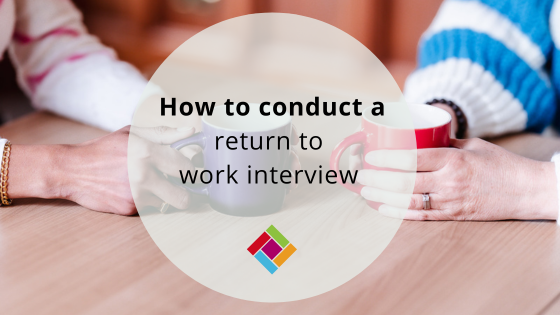
For an employee returning to the workplace after a period of absence, whether due to sickness, maternity, paternity or other long-term leave, a return to work interview is a critical step for managers. Whilst it’s not a legal requirement, this brief, yet structured conversation, helps ease employees back into the role and creates a positive workplace culture. So, what do managers need to know about return to work interviews, the key questions to ask, and why these meetings are important?
Why are return to work interviews important?
Research shows that return to work interviews can help to reduce employee absenteeism. The interviews serve multiple purposes, all contributing to creating a positive workplace. These include:
- Ensuring that the employee is ready to return to work.
- Understanding the cause of the absence, for example, if it was stress related to the job.
- Acknowledging the absence and providing a structured reintroduction to the workplace.
- Agreeing and defining a plan for the return to work, for example if the employee needs a phased return.
- Aiding communication by giving the employee a chance to share any concerns or challenges they may face on their return. These can include health issues or adjusting to life back in the workplace.
- Demonstrating the company’s support and commitment to staff wellbeing.
- Helping to reduce absenteeism by helping staff to feel more engaged and supported.
- Highlighting any reasonable adjustments that will be needed under employment law. Link to what are reasonable adjustments blog.
- Agreeing on the communication and what other colleagues are told about their absence.
- Keeping the employee up to date on any company news, changes or comms that they may have missed while absent.
Legal obligations
Employees have a duty of care to protect the health and safety of their employees whilst at work. Under the Equality Act 2010, this includes supporting them with physical and mental disabilities.
How to conduct a return to work interview
- Schedule the meeting as soon as possible when the employee returns.
- Hold the meeting in a private but comfortable setting so that the employee can speak openly.
- Keep the tone supportive and constructive so that they can express any concerns or worries.
How to prepare for the meeting
Preparation is essential. Before the meeting gather together relevant evidence and information. This includes the reason for the absence, any medical advice or fit notes provided, any recommended adjustments and any changes to the workplace that may have been made during their absence that they should know about.
Managers should also look at some the background to the absence including the total number of days and any patterns that occur (for example, absences always falling on a Friday or a Monday).
What to ask in the interview
All questions should focus on how best to support and reintegrate the employee back into the workplace. These include:
- How are you feeling about returning to work? Allowing them to share their concerns or highlight any needs.
- Do you feel you are ready to resume your usual duties? Is there anything that you may find challenging? This allows you to make reasonable adjustments.
- Did your GP or healthcare professional make any recommendations about your return? It’s essential to implement and follow any medical advice.
- Are there any reasonable adjustments you feel you need? This could include flexible working or modifications to the role.
Tips for conducting the interview
- Be supportive and practice active listening. The employee should be able to speak freely without fear of repercussion.
- Acknowledge any challenges they highlight and ensure that their concerns are validated.
- Offer practical solutions where possible and make sure you follow up on agreed actions.
- Discuss the next steps, agree on a plan and put it into writing.
- Schedule any relevant follow-up meetings to monitor progress.
- Confirm that the meeting will remain confidential.
- Be consistent. Ensure that all staff are offered return to work interviews after substantial periods of absence.
- Stay positive and focus on practical solutions.
- Train managers to understand how to conduct return to work interviews effectively.
Options to consider
In situations where the employee needs reasonable adjustments to be made, or needs extra support with their return, consider the following:
- Phased return – where an employee builds back up to their usual working hours over a period of weeks.
- Lighter than usual duties – if the employee is unable to conduct the tasks required in their usual role, consider swapping tasks until they feel able to return as usual.
- Gain advice from occupational health professionals – who can advise on workplace set up and adjustments to make the return easier.
Although a return to work interview can feel like an unnecessary formality, its impact can be significant. The goal is to help employees return to work with confidence and give them the tools they need to thrive in their role.